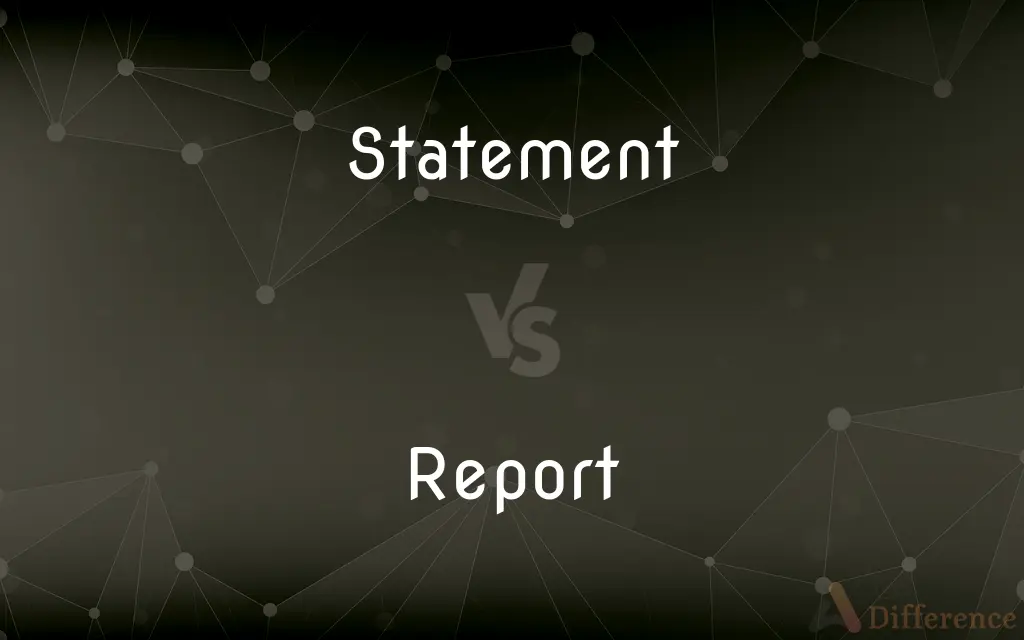Statement vs. Report — What's the Difference?
By Tayyaba Rehman & Maham Liaqat — Updated on March 19, 2024
A statement generally presents a clear, concise fact or position, while a report provides a detailed account or analysis of a situation or study.

Difference Between Statement and Report
Table of Contents
ADVERTISEMENT
Key Differences
Statements are often brief and focused, aimed at conveying specific information or a position on a topic, whereas reports are comprehensive documents that cover a subject in depth, including background, analysis, and conclusions. This key difference reflects the varying purposes and contexts in which each is used. While a statement might be used to declare a policy, opinion, or fact, a report is typically prepared to inform, analyze, or recommend based on thorough investigation.
In terms of structure, statements are usually straightforward and lack the complex organization found in reports, which often include sections like an introduction, methodology, findings, and conclusions. This structural difference underscores the distinct roles each plays in communication: a statement to assert or clarify, and a report to explore and inform.
The audience and intent behind a statement and a report can also differ significantly. Statements are often directed at a broad audience and aim to provide clear and immediate information or clarification, while reports are usually intended for a more specialized audience interested in a detailed examination of a topic.
While statements are typically short and to the point, reports are characterized by their length and depth, often incorporating data, research, and analysis to support their conclusions. This contrast highlights the differing levels of detail and scope between the two.
Comparison Chart
Purpose
To convey a specific fact or position
To provide detailed account or analysis
ADVERTISEMENT
Length
Generally short
Usually lengthy
Structure
Simple, straightforward
Complex, with multiple sections
Content
Focused information or position
Detailed information, analysis, conclusions
Audience
Broad
Specialized
Intent
To inform or clarify quickly
To inform, analyze, or recommend in depth
Compare with Definitions
Statement
A declaration or expression of an idea, opinion, or fact.
The company issued a statement denying the allegations.
Report
A document that presents information gathered through research or investigation.
The scientist published a report on the experiment's findings.
Statement
A formal account or record of events or facts.
Witnesses were asked to give a statement to the police.
Report
A formal assessment or description of a situation or problem.
The consultant prepared a detailed report on the company's marketing strategy.
Statement
A clear presentation of a financial position at a specific point in time.
The bank sends a monthly account statement to its customers.
Report
A written document prepared after thorough investigation or research.
Following the survey, the team compiled a comprehensive report on consumer trends.
Statement
An official communication of policy or position.
The government's statement on climate change outlined new policies.
Report
An account that details the proceedings, transactions, or findings of a group or event.
The committee submitted their final report to the board.
Statement
A concise expression in speech or writing.
Her statement succinctly captured the essence of the debate.
Report
A systematic presentation of data and analysis on a specific topic.
The annual financial report provides an overview of the company's fiscal health.
Statement
The act of stating or declaring
The attorney's statement took an hour.
Report
A report is a document that presents information in an organized format for a specific audience and purpose. Although summaries of reports may be delivered orally, complete reports are almost always in the form of written documents.
Statement
Something stated; a declaration
The witness made many false statements.
Report
A formal account of the proceedings or transactions of a group
A company's annual report.
Statement
A formal oral or written declaration, especially with regard to facts or claims
In a statement, the firm denied any wrongdoing.
Report
A spoken or written account of an event, usually presented in detail
A news report.
Reports of children getting food poisoning.
Statement
An abstract of a commercial or financial account showing an amount due; a bill.
Report
A person who is accountable or subordinate to another person within a company or organization
A manager with two reports.
Statement
A monthly report sent to a debtor or bank depositor.
Report
Reports(Law) Bound volumes containing the published court opinions in legal cases, intended to provide a reference for precedents in subsequent cases.
Statement
(Computers) An elementary instruction in a programming language.
Report
Reputation; repute
We know him only by report.
Statement
An overall impression or mood intended to be communicated, especially by means other than words
Glass, exposed beams, and antiques created a strong decorative statement.
Report
(Archaic) Common talk; rumor or gossip.
Statement
Having a striking appearance, often because of large size, unusual design, or extensive ornamentation
A statement necklace.
Statement furniture.
Report
An explosive noise
The report of a rifle.
Statement
A declaration or remark.
Make a statement
Publish a statement
Utter a statement
Report
To make or present an official or formal account of
The study reported a decline in heart disease. The audit reports that the company lost money.
Statement
A presentation of opinion or position.
Report
To write or provide an account or summation of for publication or broadcast
Report the news.
Statement
(finance) A document that summarizes financial activity.
A bank statement
Report
To tell about the presence or occurrence of
A burglar was reported in the area.
Statement
(computing) An instruction in a computer program, especially one that returns no value, as opposed to a function call.
Report
To relate or tell, especially from personal experience
They reported that fallen tree limbs were blocking the road.
Statement
(transitive) To provide an official document of a proposition, especially in the UK a Statement of Special Educational Needs.
Report
To submit or relate the results of considerations concerning
The committee reported the bill.
Statement
The act of stating, reciting, or presenting, orally or on paper; as, to interrupt a speaker in the statement of his case.
Report
To carry back and repeat to another
Reported the rumor of a strike.
Statement
That which is stated; a formal embodiment in language of facts or opinions; a narrative; a recital.
Report
To complain about or denounce
Reported the students to the principal.
Statement
A message that is stated or declared; a communication (oral or written) setting forth particulars or facts etc;
According to his statement he was in London on that day
Report
To make a report
Would you please report on what happened?.
Statement
A fact or assertion offered as evidence that something is true;
It was a strong argument that his hypothesis was true
Report
To serve as a reporter for a publication, broadcasting company, or other news media.
Statement
(music) the presentation of a musical theme;
The initial statement of the sonata
Report
To present oneself
Report for duty.
Statement
A nonverbal message;
A Cadillac makes a statement about who you are
His tantrums are a statement of his need for attention
Report
To be accountable or subordinate to someone
She reports directly to the board of directors.
Statement
The act of affirming or asserting or stating something
Report
(transitive) To repeat (something one has heard), to retell; to pass on, convey (a message, information etc.).
Statement
(computer science) a line of code written as part of a computer program
Report
To take oneself (to someone or something) for guidance or support; to appeal.
Statement
A document showing credits and debits
Report
To notify someone of (particular intelligence, suspicions, illegality, misconduct etc.); to make notification to relevant authorities; to submit a formal report of.
For insurance reasons, I had to report the theft to the local police station.
Report
(transitive) To make a formal statement, especially of complaint, about (someone).
If you do that again I'll report you to the boss.
Report
(intransitive) To show up or appear at an appointed time; to present oneself.
Report
(ambitransitive) To write news reports (for); to cover as a journalist or reporter.
Andrew Marr reports now on more in-fighting at Westminster.
Every newspaper reported the war.
Report
(intransitive) To be accountable to or subordinate to (someone) in a hierarchy; to receive orders from (someone); to give official updates to (someone who is above oneself in a hierarchy).
The financial director reports to the CEO.
Now that I've been promoted, I report to Benjamin, whom I loathe.
Report
To return or present as the result of an examination or consideration of any matter officially referred.
The committee reported the bill with amendments, or reported a new bill, or reported the results of an inquiry.
Report
To take minutes of (a speech, the doings of a public body, etc.); to write down from the lips of a speaker.
Report
(obsolete) To refer.
Report
To return or repeat, as sound; to echo.
Report
A piece of information describing, or an account of certain events given or presented to someone, with the most common adpositions being by (referring to creator of the report) and on (referring to the subject).
A report by the telecommunications ministry on the phone network revealed a severe capacity problem.
Report
Reputation.
Report
(firearms) The sharp, loud sound from a gun or explosion.
Report
An employee whose position in a corporate hierarchy is below that of a particular manager.
Report
To refer.
Baldwin, his son, . . . succeeded his father; so like unto him that we report the reader to the character of King Almeric, and will spare the repeating his description.
Report
To bring back, as an answer; to announce in return; to relate, as what has been discovered by a person sent to examine, explore, or investigate; as, a messenger reports to his employer what he has seen or ascertained; the committee reported progress.
There is no man that may reporten all.
Report
To give an account of; to relate; to tell; to circulate publicly, as a story; as, in the common phrase, it is reported.
It is reported among the heathen, and Gashmu saith it, that thou and the Jews think to rebel.
Report
To give an official account or statement of; as, a treasurer reports the receipts and expenditures.
Report
To return or repeat, as sound; to echo.
Report
To return or present as the result of an examination or consideration of any matter officially referred; as, the committee reported the bill witth amendments, or reported a new bill, or reported the results of an inquiry.
Report
To make minutes of, as a speech, or the doings of a public body; to write down from the lips of a speaker.
Report
To write an account of for publication, as in a newspaper; as, to report a public celebration or a horse race.
Report
To make a statement of the conduct of, especially in an unfavorable sense; as, to report a servant to his employer.
Report
To make a report, or response, in respect of a matter inquired of, a duty enjoined, or information expected; as, the committee will report at twelve o'clock.
Report
To furnish in writing an account of a speech, the proceedings at a meeting, the particulars of an occurrence, etc., for publication.
Report
To present one's self, as to a superior officer, or to one to whom service is due, and to be in readiness for orders or to do service; also, to give information, as of one's address, condition, etc.; as, the officer reported to the general for duty; to report weekly by letter.
Report
That which is reported.
It was a true report that I heard in mine own land of thy acts and of thy wisdom.
Cornelius the centurion, a just man, and . . . of good report among all the nation of the Jews.
Report
Sound; noise; as, the report of a pistol or cannon.
Report
Rapport; relation; connection; reference.
The corridors worse, having no report to the wings they join to.
Report
A written document describing the findings of some individual or group;
This accords with the recent study by Hill and Dale
Report
A short account of the news;
The report of his speech
The story was on the 11 o'clock news
The account of his speech that was given on the evening news made the governor furious
Report
The act of informing by verbal report;
He heard reports that they were causing trouble
By all accounts they were a happy couple
Report
A sharp explosive sound (especially the sound of a gun firing);
They heard a violent report followed by silence
Report
A written evaluation of a student's scholarship and deportment;
His father signed his report card
Report
An essay (especially one written as an assignment);
He got an A on his composition
Report
The general estimation that the public has for a person;
He acquired a reputation as an actor before he started writing
He was a person of bad report
Report
To give an account or representation of in words;
Discreet Italian police described it in a manner typically continental
Report
Announce as the result of an investigation, or announce something to the proper authorities;
Dozens of incidents of wife beatings are reported daily in this city
The team reported significant advances in their research
Report
Announce one's presence;
I report to work every day at 9 o'clock
Report
Make known to the authorities;
One student reported the other to the principal
Report
Be responsible for reporting the details of, as in journalism;
Snow reported on China in the 1950's
The cub reporter covered New York City
Report
Complain about; make a charge against;
I reported her to the superviser
Common Curiosities
Is the audience for statements and reports always different?
Not always, but typically, statements are aimed at a broader audience, while reports are intended for those requiring detailed information or analysis on a subject.
How do the purposes of statements and reports differ?
Statements aim to clarify, inform, or present a position quickly and succinctly, while reports aim to provide a thorough examination, analysis, or overview of a subject, often to inform decision-making or provide insights.
Can a report contain statements?
Yes, reports can contain statements as part of their findings or conclusions, especially when summarizing key points or presenting specific facts derived from the analysis.
Are statements always shorter than reports?
Generally, yes. Statements are designed to be brief and to the point, while reports are detailed and cover a topic in depth.
Are reports always written, or can they be presented in other formats?
While reports are commonly written documents, they can also be presented orally, as in a board meeting, or visually, using slideshows or infographics, especially when summarizing key findings.
How does the language used in statements and reports differ?
Statements often use direct and assertive language to convey clarity and decisiveness, whereas reports typically employ a more formal, analytical tone to discuss findings and implications in depth.
Can both statements and reports be used for legal or official purposes?
Yes, both can serve legal or official functions. Statements might be used in legal declarations or public announcements, while reports could be part of regulatory filings, research publications, or audit documentation.
Can a statement form part of a report?
Yes, a statement can be included in a report, especially in the executive summary, conclusions, or recommendations sections, to clearly articulate key points.
How do confidentiality concerns affect the preparation of statements and reports?
Confidentiality can significantly impact both, necessitating careful consideration of the information included. Reports, in particular, may require redaction or restricted access due to the detailed data they contain.
When should I use a statement instead of a report?
Use a statement when you need to communicate a specific fact, position, or policy clearly and concisely. Opt for a report for detailed analysis, research findings, or comprehensive assessments.
How does the revision process differ for statements and reports?
Statements, due to their shorter length, typically undergo fewer revisions focused on clarity and impact. Reports may require extensive revisions to ensure accuracy, comprehensiveness, and coherence in presenting complex information.
In what scenarios might a statement lead to the development of a report?
A statement, particularly if it raises questions or highlights issues, might prompt a more detailed investigation or analysis, resulting in the creation of a report to explore the matter further.
What role do visuals play in statements and reports?
Visuals are rare in statements due to their brevity and focus on text. In contrast, reports often use charts, graphs, and tables to complement the text and illustrate data and trends more effectively.
How important is the audience's background knowledge in understanding statements and reports?
Audience background is crucial; statements assume less specialized knowledge, aiming for broad accessibility, while reports often target an audience with specific interests or expertise, assuming a certain level of background knowledge.
How do digital media influence the presentation and consumption of statements and reports?
Digital media have expanded the formats and platforms for both, enabling interactive elements in reports and wider, immediate distribution of statements through social media and other online channels, potentially reaching a global audience.
Share Your Discovery

Previous Comparison
Ginger vs. Onion
Next Comparison
Megahertz vs. MegabyteAuthor Spotlight
Written by
Tayyaba RehmanTayyaba Rehman is a distinguished writer, currently serving as a primary contributor to askdifference.com. As a researcher in semantics and etymology, Tayyaba's passion for the complexity of languages and their distinctions has found a perfect home on the platform. Tayyaba delves into the intricacies of language, distinguishing between commonly confused words and phrases, thereby providing clarity for readers worldwide.
Co-written by
Maham Liaqat















































